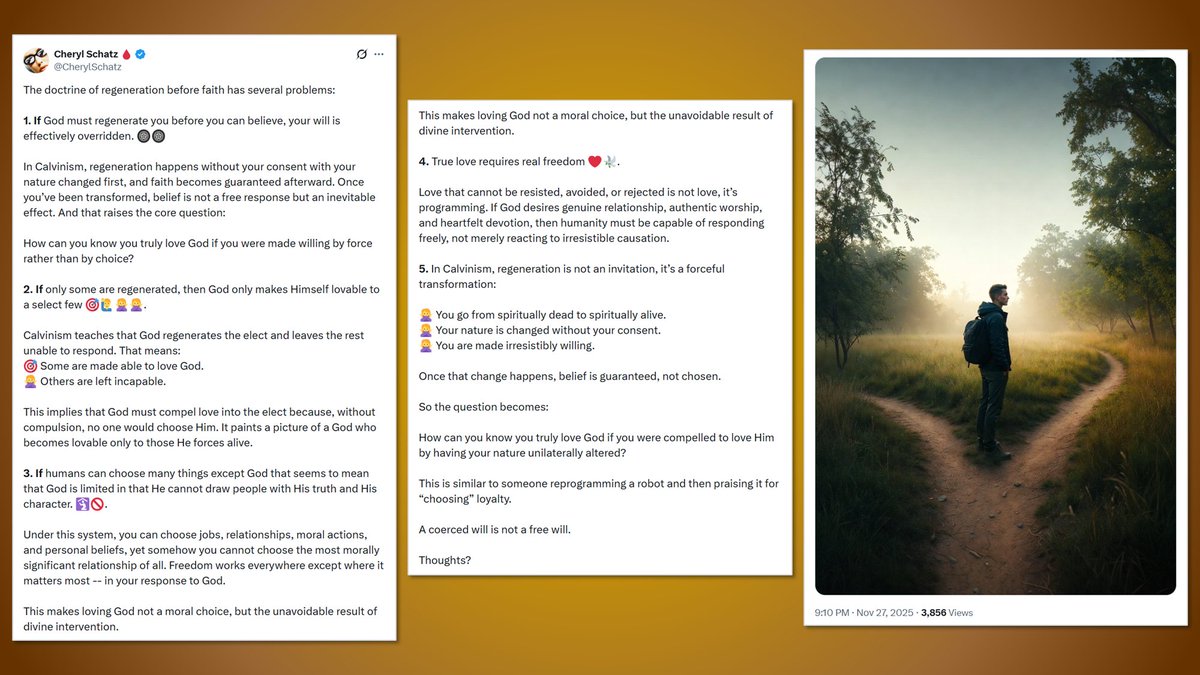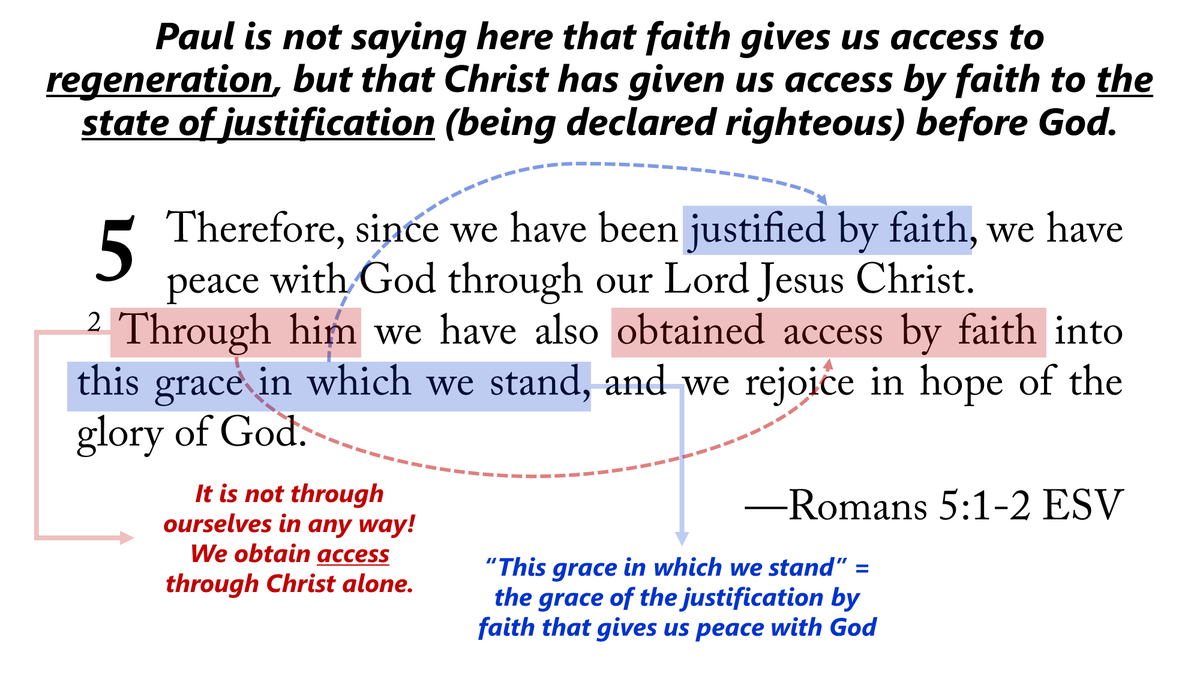
Co-Author of that Bill Gothard book: https://t.co/3lokJ6AyZ3 | Author, Darby, Dualism, & the Decline of Dispensationalism: https://t.co/jjO1dRBX3u | PCA
How to get URL link on X (Twitter) App


 𝟏/𝟓
𝟏/𝟓

https://x.com/Pastor_Gabe/status/2006458868424155395?s=20𝟐/𝟕: Regeneration Causes Faith in Deuteronomy 29:4, 30:1-6


 Evangelical inerrantists are on the same page as Augustine and apparently Jerome were in the 5th century.
Evangelical inerrantists are on the same page as Augustine and apparently Jerome were in the 5th century.

 I don’t know why the NIV and CSB chose to render the participial form of ἐνεργέω (energéō) as “works out,” which generally means something like “solves” or “resolves,” as in the title of the Beatles’ song, “We Can Work It Out.” The Greek word doesn’t have that meaning.
I don’t know why the NIV and CSB chose to render the participial form of ἐνεργέω (energéō) as “works out,” which generally means something like “solves” or “resolves,” as in the title of the Beatles’ song, “We Can Work It Out.” The Greek word doesn’t have that meaning.
 “1. Given Paul’s stated purpose was to ‘instruct certain people not to teach strange doctrines’ (1Ti 1:3), why did it shift to ‘instruct all women to not teach true doctrine to any male over 17’?”
“1. Given Paul’s stated purpose was to ‘instruct certain people not to teach strange doctrines’ (1Ti 1:3), why did it shift to ‘instruct all women to not teach true doctrine to any male over 17’?”
 Wesley says, “the problem is not the woman having the position but the means by which she obtains it.” But that’s not supported by either the standard New Testament Greek lexicon (BDAG), the standard Classical Greek lexicon (LSJ), or the more recent BrillDAG for Classical Greek.
Wesley says, “the problem is not the woman having the position but the means by which she obtains it.” But that’s not supported by either the standard New Testament Greek lexicon (BDAG), the standard Classical Greek lexicon (LSJ), or the more recent BrillDAG for Classical Greek. 

 Since “homosexual” didn’t enter the English language unti 1891, it’s unsurprising we don’t find it in English Bibles until the 20th century. But we find even more graphic terms before that, such as “buggerers” in the 1557 Geneva Bible New Testament.
Since “homosexual” didn’t enter the English language unti 1891, it’s unsurprising we don’t find it in English Bibles until the 20th century. But we find even more graphic terms before that, such as “buggerers” in the 1557 Geneva Bible New Testament.

 Well, @Duke456521, since all my remarks here echo Provisionism’s actual statements, including what’s written in its official statement of faith, “What is Provisionism?” I could just as easily question your honesty, couldn’t I?
Well, @Duke456521, since all my remarks here echo Provisionism’s actual statements, including what’s written in its official statement of faith, “What is Provisionism?” I could just as easily question your honesty, couldn’t I? 

 As far as many social media advocates are concerned, it’s quite obvious that Paul is telling his Roman audience that Andronicus and Junia are not only apostles but outstanding or prominent ones (ἐπίσημος, epísēmos), which raises the question of why we only read about them here.
As far as many social media advocates are concerned, it’s quite obvious that Paul is telling his Roman audience that Andronicus and Junia are not only apostles but outstanding or prominent ones (ἐπίσημος, epísēmos), which raises the question of why we only read about them here.


 I’m sure it would have come as a surprise to the compilers of the venerable standard LSJM lexicon for Classical Greek, since they found this meaning for πᾶς as far back as Homer (8th century ʙᴄ). 𝟐/𝟕
I’m sure it would have come as a surprise to the compilers of the venerable standard LSJM lexicon for Classical Greek, since they found this meaning for πᾶς as far back as Homer (8th century ʙᴄ). 𝟐/𝟕 

https://twitter.com/aspin3/status/1679259947169660930
 @aspin3 And why do you ignore the fact that Paul is not referring to the grace of regeneration but the grace of justification, which I have clearly stated comes after faith? First regeneration, then faith, then justification. Ro 5:1-2 isn’t dealing with regeneration but justification.
@aspin3 And why do you ignore the fact that Paul is not referring to the grace of regeneration but the grace of justification, which I have clearly stated comes after faith? First regeneration, then faith, then justification. Ro 5:1-2 isn’t dealing with regeneration but justification.

 @Soteriology101 To even suggest that believers have libertarian free will (LFW) simply because God provides a way of escape from temptation calls into question your understanding of that term means.
@Soteriology101 To even suggest that believers have libertarian free will (LFW) simply because God provides a way of escape from temptation calls into question your understanding of that term means.

 I told him I hoped to be able to fulfill this request today, and that I trusted “top three” did not represent a limit. Plus, I decided to do more than just list them. Hence this thread.
I told him I hoped to be able to fulfill this request today, and that I trusted “top three” did not represent a limit. Plus, I decided to do more than just list them. Hence this thread.
 @bethallisonbarr @megbasham @tomascol @TomBuck @RodDMartin On June 20, Barr says she “didn’t actually look at the list,” but she obviously (a) knew that there was a list, (b) knew that it identified women pastors in the SBC, and (c) raised no ethical concerns about its existence.
@bethallisonbarr @megbasham @tomascol @TomBuck @RodDMartin On June 20, Barr says she “didn’t actually look at the list,” but she obviously (a) knew that there was a list, (b) knew that it identified women pastors in the SBC, and (c) raised no ethical concerns about its existence.

 Well sure, God doesn’t exaggerate. Agreed. You make an excellent point. But since God inspired Scripture, what did 𝐻𝑒 mean when He inspired Paul to say, “I have suffered the loss of 𝑎𝑙𝑙 [Greek: 𝑝𝑎̃𝑠 (πᾶς)] things,” (Phil 3:8)? Paul wrote this under the…𝟏/𝟏𝟔
Well sure, God doesn’t exaggerate. Agreed. You make an excellent point. But since God inspired Scripture, what did 𝐻𝑒 mean when He inspired Paul to say, “I have suffered the loss of 𝑎𝑙𝑙 [Greek: 𝑝𝑎̃𝑠 (πᾶς)] things,” (Phil 3:8)? Paul wrote this under the…𝟏/𝟏𝟔
